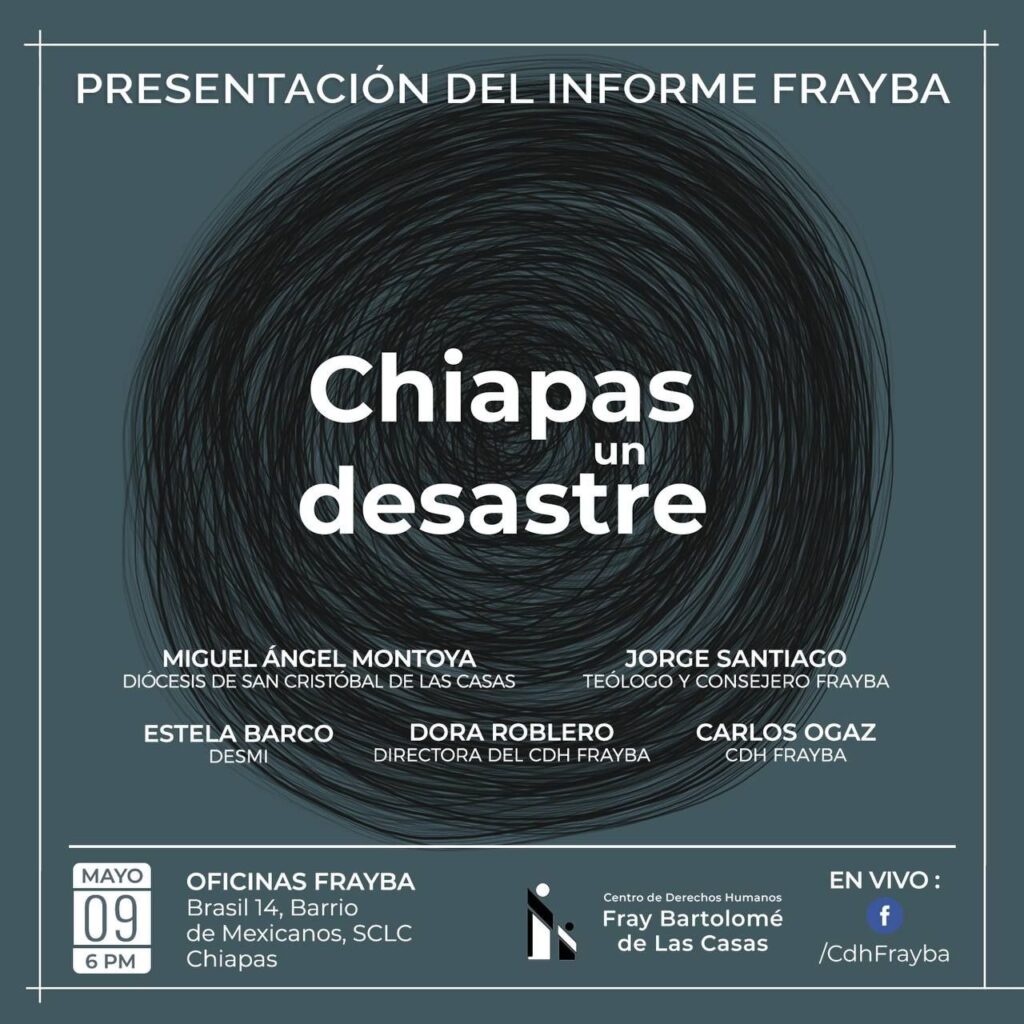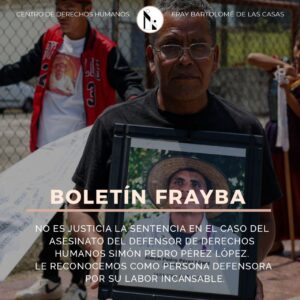Sorry, this entry is only available in Español. For the sake of viewer convenience, the content is shown below in the alternative language. You may click the link to switch the active language.
Europa, Tierra insumisa, Slumil K’ajxemk’op, enero de 2022
Señoras y Señores:
Como Red de Resistencia y Rebeldía y en apoyo a la lucha por la vida de nuestras compañeras y compañeros Zapatistas, y como adherentes a la Sexta Declaración de la Selva Lacandona, participamos en la campaña “Nuestra lucha es por la vida” y denunciamos enérgicamente las violencias ejercidas en contra de los pueblos indígenas de Chiapas. Esto ocurre dentro de un marco de total impunidad, que persiste a pesar de varias denuncias documentadas dirigidas a los 3 niveles del gobierno mexicano.
Recalcamos que no se trata de conflictos entre comunidades o familias pobres, como lo afirma la versión oficial, que ha servido de excusa para dejar actuar la violencia en total impunidad. Se trata de conflictos fomentados por una presencia paramilitar impune que busca sembrar terror en un proceso de guerra de baja intensidad.
Afirmamos nuestro apoyo a las comunidades de Moisés y Gandhi y Nuevo San Gregorio, que dependen de la Junta de Buen Gobierno “Nuevo Amanecer en Resistencia y Rebeldía por la Vida y la Humanidad”, del Caracol 10 “Floreciendo la Semilla Rebelde”.
Desde el verano de 2020, la ORCAO, grupo de paramilitares, ha llevado a cabo acciones de extrema violencia al amparo de las autoridades del municipio de Ocosingo, donde gobierna el mal llamado Partido Verde (apéndice del PRI y que hace el trabajo sucio de Morena), cuyo principal líder es funcionario del municipio. Este grupo de paramilitares actúa cobijado por el gobernador del estado de Chiapas, Rutilio Escandón Cadenas, a cambio de los votos que le dio el Partido Verde para llegar a la gobernatura de Chiapas.
Entre los ataques que han llevado a cabo los paramilitares de la ORCAO, los cuales se han denunciado públicamente, y que hasta el momento han quedado en total impunidad, están:
- 22 de agosto de 2020: saqueo, robo y quema de la tienda “El Arco Iris”, ubicada en el crucero Cushuljá, municipio de Ocosingo;
- 8 de noviembre de 2020: denuncia por parte de la Junta de Buen Gobierno de Patria Nueva del “secuestro y tortura de un compañero Base de Apoyo Zapatista de la comunidad de San Isidro, anexo de Moisés y Gandhi, por parte de la organización paramilitar llamada ORCAO”;
- 11 de septiembre de 2021: secuestro de dos integrantes de la Junta de Buen Gobierno, José Antonio Sánchez Juárez y Sebastián Núñez Pérez, ^por el grupo paramilitar que les ha mantenido desaparecidos hasta el día 19 de septiembre;
- 21 de noviembre de 2021: otro ataque con armas de fuego por parte de los paramilitares de la ORCAO a la comunidad de Moisés y Gandhi, e incendio de la escuela secundaria autónoma zapatista;
- desde noviembre de 2019, en la misma zona, el poblado de Nuevo San Gregorio sufre la invasión de sus tierras por “el grupo de los 40”, cuyos líderes han sido identificados y denunciados públicamente varias veces. Hoy en día, de sus 155 hectáreas, sólo le quedan 7 hectáreas al pueblo, y sus habitantes han sido reducidos a una situación de campesin@s sin tierra. A pesar de que dichos actos fueron documentos y denunciados el 2 de diciembre de 2021 por parte de la Junta de Buen Gobierno y del CDH Fray Bartolomé de las Casas, con fecha del 2 de diciembre, el mismo grupo invasor entró los 6 y 7 de diciembre a arar el potrero colectivo de la comunidad, dejando 22 cabezas de ganado sin alimento. Es importante aclarar que el supuesto arado solo tuvo el objetivo poner en peligro la supervivencia del ganado. Con cada invasión, l@s habitantes de Nuevo San Gregorio se sienten “secuestrad@s”; ya no pueden desplazarse, ni trabajar ni siquiera salir de sus casas, sometid@s a la observación y presencia de los agresores apostados en varios lugares estratégicos.
Existen testimonios e imágenes de los vínculos amistosos entre el grupo de los 40 y la policía municipal de Huixtán. Así que ¿se puede hacer todo esto en Chiapas bajo la mirada de la policía y del ejército? ¿Robar tierras? ¿Secuestrar a la gente? ¿Desplazarla? ¿El concepto de respeto a los derechos humanos será menos importante que la lógica capitalista de la 4T?
Los invasores del “grupo de los 40” pusieron un precio a las tierras que robaron: 100 000 pesos por hectárea, o sea más de 4300 euros, un precio exorbitante en la región. ¿Quién comprará estas tierras robadas? ¿El Estado o una multinacional de la electricidad que por fin podrá construir la presa de agua planeada hace unos años, cuando la cañada esté librada de l@s Zapatistas, guardianes de las tierras y protectores de la vida?
Esta serie de actos de violencia, incluido la detención ilegal y arbitraria de autoridades autónomas, ha sido denunciada tanto por las Juntas de Buen Gobierno como por organizaciones nacionales e internacionales. Los que firmamos la presente urgimos al Estado mexicano, quien tiene conocimiento pleno de los hechos por lo menos desde marzo de 2020, a que ponga en marcha acciones tendientes a terminar de una vez por todas las acciones violentas y de despojo que muchas veces vienen apoyadas por autoridades locales, municipales y estatales, y a respetar la tierra y el territorio que pertenecen al EZLN en el marco de los Acuerdos de San Andrés, la Ley de Concordia y Pacificación, el Convenio 169 de la OIT, la Declaración de las Naciones Unidas sobre los derechos de los pueblos indígenas y de los Estados Americanos.
- El 10 de enero de 2022, en esta misma zona del Caracol 10, la comunidad autónoma 16 de Febrero fue atacada por un grupo armado: una mujer y sus 3 hijos fueron desaparecidos por 24 horas. Denunciamos enérgicamente estas desapariciones forzadas.
- También denunciamos la inacción de los 3 niveles de gobierno ante el clima de guerra y el desplazamiento de miles de personas durante el año 2021 en la región de Aldama a causa de ataques seguidos de grupos paramilitares (últimamente, 36 ataques con arma de fuego los 7, 8, 9, y 10 de enero de 2022), dejando a una persona base de apoyo zapatista muerta, quien primero fue herida mientras iba junto con su familia a trabajar a su milpa.
- Denunciamos de igual manera el asesinato de Simón Pedro Pérez, ex-presidente de la organización pacifista de Las Abejas, que sigue en la espera de una verdadera justicia en respuesta a la masacre de Acteal en 1997.
El Estado de Chiapas está al borde de la guerra civil. Es una situación creada por el mismo Estado mexicano: desde 1994, su estrategia contra-insurreccional ha favorecido la surgimiento de grupos paramilitares que actúan en total impunidad.
Ha fomentado el desmantelamiento de los ejidos y la división de las comunidades, cuyos usos y costumbres eran la gestión colectiva tanto de la vida como de las tierras.
Promueve y alienta los grandes proyectos capitalistas como las minas o el mal llamado Tren Maya que sólo pueden concretizarse desplazando comunidades enteras y obligándolas a romper con sus usos y costumbres.
Crea programas de “ayuda”, como “Sembrando vida”, que favorecen tanto la destrucción del modo de vivir en colectivo de los pueblos indígenas y la de las tierras, estimulando la monocultura productivista, como la invasión de las tierras por grupos violentos (ayuda otorgada a condición de poseer más de 2,5 hectáreas).
Denunciamos la violencia en contra de los pueblos indígenas zapatistas y su impunidad.
Exigimos que los responsables institucionales actúen como debe de ser dentro de un Estado de derecho, respetando la vida y los derechos de los pueblos originarios. Ya es tiempo que los 3 niveles de gobierno actúen para detener la violencia que va en aumento en el Estado de Chiapas.
Nosotr@s seguiremos apoyando la organización, la autonomía y la resistencia de las comunidades zapatistas por todos los medios posibles, porque l@s Zapatistas luchan por la vida, por la protección de la tierra y por ende por la de la humanidad.
Firmas:
- Colectiva Mujeres y disidencias de la Sexta en la Otra Europa y Abya Yala – Red de Resistencias y Rebeldías
- Groupe CafeZ, Liège, Bélgica
- Casa Nicaragua, Liège, Bélgica
- Identité Amérique Indienne, Liège
- RAIZCOF – Réseau d’amitié et d’inspiration zapatiste en Condroz-Famenne, Bélgica
- La Gang éco!féministe, Bélgica
- Le petit théâtre de la Grande Vie, Bélgica
- Americasol-Réseau Escargot, Francia
- Collectif inter-collines des 2 rives de la rivière Aveyron (Colectivo intercerros de las 2 orillas del río Aveyron), Francia
- Quartier libre des lentillères Francia
- Espace autogéré des Tanneries, Francia
- Mut Vitz 13
- Colectivo París Ayotzinapa, Francia
- Universidad de la Tierra, Puebla
- Colectivo Utopía, Puebla
- Colectivo Utopia
- Colectiva Zurcando el tiempo
- Cecilia Zeledón
- Kathia Behaeghel, Bélgica
- Geert Carpel, Bélgica
- Patrick Dessart, Liège, Bélgica
- Geneviève Michel, Bélgica
- Jean-Claude Charlier, Jupille, Bélgica
- Martine Gerardy, Bélgica
- Orlando Kintero, muralista
- Union syndicale Solidaires, Francia
- Yala Colectiva Nantes, Francia
- Colectivo Armadillo Finlandia
- Caravana Zapatista Portugal
- Associazione Ya Basta! Êdî Bese!, Italia
- Scotland Zapatista, Escocia
- Latir por México, París
- Alerta feminista, París
- Brigada Serpientes, París
- Miradas-Caracol, Madrid
- Olivier Vermeulen, Bélgica
- Natalia Hirtz
Carta dirigida a:
Lic. Andrés Manuel López Obrador. Presidente Constitucional de México
Lic. Adán Augusto López Hernández. Secretario de Gobernación de México
Lic. Alejandro de Jesús Encinas Rodríguez. Subsecretaría de Derechos Humanos, Población y Migración
Lic. Rosario Piedra Ibarra. Presidente de la Comisión Nacional de Derechos Humanos
Lic. Rutilio Escandón Cadenas. Gobernador Constitucional del Estado de Chiapas
Lic. Victoria Cecilia Flores Pérez. Secretaria General de Gobierno en Chiapas
Lic. Juan José Zepeda Bermúdez. Presidente de la Comisión Estatal de Derechos Humanos.
Via :
- Sandra Fuentes-Berain, embajadora de México en Bélgica
- Blanca Elena Jiménez Cisneros, embajadora de México en Francia
Con copia a: Mujeres y la Sexta, México









